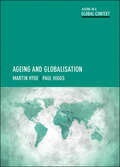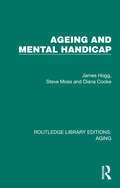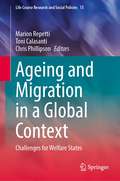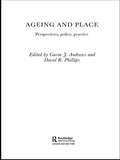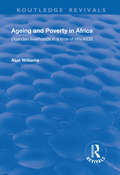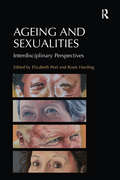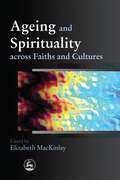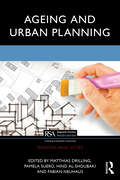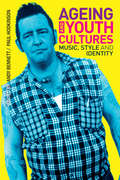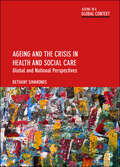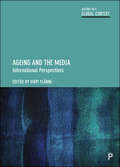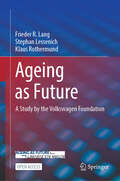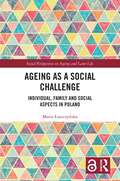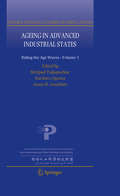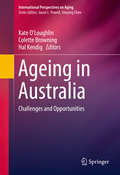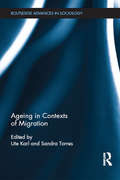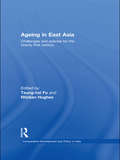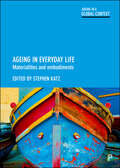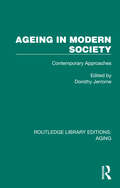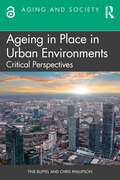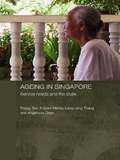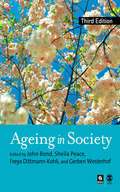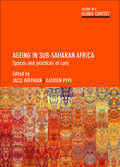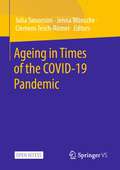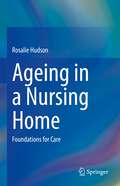- Table View
- List View
Ageing and Globalisation (Ageing in a Global Context)
by Martin Hyde Paul HiggsPopulation ageing and globalisation represent two of the most radical social transformations that have occurred. This book provides, for the first time, an accessible overview of how they interact. Ageing has been conventionally framed within the boundaries of nation states, yet demographic changes, transmigration, financial globalization and the global media have rendered this perspective problematic. This much-needed book is the first to apply theories of globalisation to gerontology, including Appadurai’s theory, allowing readers to understand the implications of growing older in a global age. This comprehensive introduction to globalisation for gerontologists is part of the Ageing in a Global Context series, published in association with the British Society of Gerontology. It will be of particular interest to advanced undergraduate and postgraduate students and academics in this area.
Ageing and Mental Handicap (Routledge Library Editions: Aging)
by James Hogg Diana Cooke Steve MossIn the 1980s there was growing interest in the topic of ageing and learning disabilities, for two principal reasons. First, the life expectancy of people with learning disabilities had risen significantly over the previous decades and many, once infancy had been survived, could expect a life span similar to that of non-disabled people. Secondly, a growing commitment on the part of the government and service providers to make provision for people with disabilities in the community rather than in institutions, had focused attention on this group.
Ageing and Migration in a Global Context: Challenges for Welfare States (Life Course Research and Social Policies #13)
by Chris Phillipson Marion Repetti Toni CalasantiThis book brings together two major trends influencing economic and social life: population ageing on the one side, and migration on the other. Both have assumed increasing importance over the course of the 20th and into the 21st century. The book offers a unique interdisciplinary perspective on the challenges posed by the globalisation of the life course to welfare states’ old age and family policies. Through a variety of case studies, it covers a wide range of migration scenarios: those who migrate in later life; migrants from earlier years who age in place; and old people who hire migrant caregivers. It shows how both local and global economic inequalities intersect to frame interactions between ageing, migration, and family support. Across a wide variety of situations, it highlights that migration can both create risks for older people, but also serve as an answer to ageing-related social, economic, and health risks. The book explores tensions between national and global contexts in experiences of migration across the life course. As such this book offers a fascinating read to scholars, students, practitioners, and policy makers in the fields of aging, migration, life course, and population health.
Ageing and Place (Routledge Studies in Human Geography)
by David R. Phillips Gavin J. AndrewsDuring recent years, an increasing amount of academic research has focused on older people with a particular emphasis on settings, places and spaces. This book provides a comprehensive review of research and the policy area of 'ageing and place'. An insightful book on an important topic, Andrews and Phillips have together edited a valuable information and reference source for those with interests in the spatial dimensions of ageing in the twenty-first century. Ranging from macro-scale perspectives on the distribution of older populations on national scales, to the meaning of specific local places and settings to older individuals, on the micro-scale, the book spans an entire range of research traditions and international perspectives.
Ageing and Poverty in Africa: Ugandan Livelihoods in a Time of HIV/AIDS
by Alun WilliamsThis title was first published in 2003. The rapid demographic aging of populations worldwide, and most dramatically in developing countries, will result in unprecedented increases in the absolute and relative numbers of the aged in these countries. Whilst developed economies already have the basic infrastructure in place through which to support their ageing populations, developing nations frequently do not, and it should not be assumed that their best course of action is to attempt to duplicate the supportive infrastructures of developed countries. In developing nations these may be culturally inappropriate, geographically inaccessible, economically or politically unsustainable, or all of these. Effective and sustainable support services must be designed with reference to the circumstances of the client group, and it is increasingly evident that knowledge of the lives of the aged in developing countries is currently very limited. This book aims to inform the reader on the livelihoods of elders in developing countries and to stimulate a discussion of appropriate methods of supporting them in maintaining their quality of life during and beyond the coming decades of demographic change. It does so through reporting the lives and livelihoods of the aged population of Kikole (a pseudonym), a highly impoverished village in Uganda. Individual livelihoods are explored from a lifecourse perspective, with present day quality of life being shown often to be the result of earlier enforced changes in circumstances arising in economic, social or cultural marginalization, political or physical insecurity, or macro-economic change, rather than in the physical or mental changes that may accompany advancing age.
Ageing and Sexualities: Interdisciplinary Perspectives
by Elizabeth Peel Rosie HardingThis book showcases developments in theory, research and practice regarding sexuality and ageing, considering the differences as well as similarities between and among ageing heterosexual and LGBT older people. Identifying the questions central to future social scientific research on ageing and sexuality, it focuses on the important, emerging dimensions of sexuality and ageing: embodiment, the diversification of the ageing context and the intersections of care and sexuality. With attention to the different forms of sexualities, particularly at their intersection with gender, this volume explores the importance of spatial and relational contexts, whether individual, residential or virtual, with authors offering studies of online dating, sexuality in the context of residential care and the relationship between sexuality, legal frameworks and social policy. Interdisciplinary in scope and offering the latest research from scholars in the UK, Australasia and Africa, Ageing and Sexualities constitutes an integrated approach to the conceptual and practical challenges of understanding the interplay of ageing and sexuality in contemporary society. As such, it will appeal to scholars from a variety of disciplinary backgrounds, including sociology, cultural studies, socio-legal studies, social gerontology, psychology, medicine and health care.
Ageing and Spirituality across Faiths and Cultures
by Edited by Elizabeth MacKinlayHealth and social care practitioners are increasingly called upon to provide care to elderly people from a number of different faiths and cultures. This collection of essays examines ageing in the context of the many faiths and cultures that make up Western society, and provides carers with the knowledge they need to deliver sensitive and appropriate care to people of all faiths. Chapters are written by authoritative figures from each of the world's major faith groups about the beliefs and practices of their older people. Christian, Muslim, Hindu, Jewish and Buddhist perspectives are covered, as well as those of ageing veterans and ageing religious sisters. Issues of appropriate care are also addressed, and the book includes recommendations for policy and practice. This accessible and inspiring book will be a useful text for academics, policy makers and practitioners in health and social care, aged care workers, pastoral carers, chaplains and religious professionals, in hospital, residential and other care settings.
Ageing and Urban Planning (Regions and Cities)
by Fabian Neuhaus Matthias Drilling Hind Al-Shoubaki Pamela SueroAgeing and Urban Planning provides a critical analysis of urban planning in the face of demographic change. It emphasises the importance of international approaches and practices to address age-friendly planning. This process requires collaboration between professionals and the community, going beyond mere functionality to connect the micro and macro scales at the city, region, nation, and the global level.With an interdisciplinary and intersectional approach, the book draws on analytical lenses from architecture, gerontology, geography, sociology, and social and urban planning. It offers a thorough critique of popular narratives surrounding ageing and urban planning while presenting diverse case studies on a variety of spatial scales. The volume also covers the history of urban design for ageing and inclusivity in planning governance, as well as a critical look at the concept of "ageing in place" from the perspective of urban planning. The book offers a comprehensive selection of in-depth photos and figures from urban design studios, planning processes, and real-life scenarios. This collection provides a unique network of inspiring ideas. The book ultimately seeks to supplement the debate and promote a broader reflection about the transformations required in urban planning, given the opportunities and challenges related to a world with increased longevity.This valuable resource is recommended for advanced students, researchers, and policymakers in the fields of urban planning, age-related disciplines and professions, and social policy.
Ageing and Youth Cultures: Music, Style and Identity
by Paul Hodkinson Andy BennettWhat happens to punks, clubbers, goths, riot grrls, soulies, break-dancers and queer scene participants as they become older? For decades, research on spectacular 'youth cultures' has understood such groups as adolescent phenomena and assumed that involvement ceases with the onset of adulthood. In an age of increasingly complex life trajectories, Ageing and Youth Cultures is the first anthology to challenge such thinking by examining the lives of those who continue to participate into adulthood and middle-age. Showcasing a range of original research case studies from across the globe, the chapters explore how participants reconcile their continuing involvement with ageing bodies, older identities and adult responsibilities. Breaking new ground and establishing a new field of study, the book will be essential reading for students and scholars researching or studying questions of youth, fashion, popular music and identity across a wide range of disciplines.
Ageing and the Crisis in Health and Social Care: Global and National Perspectives (Ageing in a Global Context)
by Bethany SimmondsNeoliberal political discourses have normalised the belief in northern European countries that individuals are responsible for their health and wellbeing, regardless of social class, gender or ethnic background. Drawing on examples from Germany, Sweden and the UK, Simmonds critically examines how the neoliberalisation and marketisation of health and social care have created an adverse environment for older people, who lack social and cultural capital to access the care they need. This crucial analysis scrutinises provision for ageing populations on an individual, national and global level. Challenging current political and social policy approaches, this rigorous text discusses innovative solutions to contemporary challenges in a complex care system.
Ageing and the Media: International Perspectives (Ageing in a Global Context)
by Virpi YlänneMedia representations of ageing play a role in stereotype formation and even reinforce them. Encountering these stereotypes can negatively impact the self-esteem, health status, physical wellbeing and cognitive performance of older people. This international collection examines different dimensions of ageing and ageism in a range of media. Chapters include explorations of the UK media during the COVID-19 pandemic; age, gender and mental health in Ghana; advertising in Brazil; magazines in Canada; Taiwanese newspapers; comics, graphic novels and more. Bringing together leading scholars, this book critically considers differences in media portrayals and how older adults use and interact with the media.
Ageing as Future: A Study by the Volkswagen Foundation
by Stephan Lessenich Frieder R. Lang Klaus RothermundContemporary societies are aging – but what does that mean? Is this something bad? And can societies age as a whole? By bringing together psychological, gerontological, and sociological findings, this open access book opens up a hitherto unique, multifaceted, and realistic view of the phenomenon of old age and the process of aging. The volume is based on the results of the project “Ageing as Future”, a long-term project network (2007-2021) involving a total of more than 30 scientists worldwide. The focus of the project was threefold: A first issue was concerned with how views on aging influence development in old age; secondly, the project analyzed determinants and consequences of provision for old age; and thirdly, it investigated the different ways in which aging is shaped by managing time in old age. For more than a decade, the authors conducted quantitative and qualitative studies, involving large samples from three different continents. The results show that one-sided views of old age – whether negative stereotypes or positive exaggerations – do not do justice to the complexity of the experience of aging. Based on these results, the authors plead for individual and societal acceptance of the social fact of aging – and for the right to live an autonomous and dignified life in old age just as in other phases of life. Ageing as Future: A study by the Volkswagen Foundation presents findings from a unique large international study that are of interest to aging researchers around the world: academically, socio-politically, practically, and personally. Whether old or young, the book encourages one to question one's own views of aging. When reading this book, it becomes obvious that old age is a highly diverse experience, depending on a host of societal and individual factors.
Ageing as a Social Challenge: Individual, Family and Social Aspects in Poland (Social Perspectives on Ageing and Later Life)
by Maria ŁuszczyńskaWith a focus on the case of Poland, where an ageing population poses a crucial challenge for the state’s social, family, and gerontological policy, this book explores ageing as a personal and social phenomenon, considering the ways in which the experience of ageing is shaped by younger generations’ attitudes, government support policies, local initiatives undertaken help older people stay active, and the ways in which the elderly themselves understand their own mortality. Employing demographic, philosophical, legal, psychological, gerontological perspectives, it emphasises activities that can support older adults locally or nationwide and proposes the development of a social policy and social attitudes that can facilitate changes in the social perception of ageing, together with a redistribution of resources for older adults. As such, it will appeal to scholars across the social sciences with interests in ageing and the lifecourse, as well as those who wish to support older adults with concrete solutions and familiarize themselves with the ageing process from an individual and social perspective.
Ageing in Advanced Industrial States: Riding the Age Waves - Volume 3 (International Studies in Population #8)
by Naohiro Ogawa Anne H. Gauthier Shripad TuljapurkarPopulation growth slowed across the world in the last decades of the 20th century, changing substantially our view of the future. The 21st century is likely to see the end to world population growth and become the century of population aging, marked by low fertility and ever-increasing life expectancy. These trends have prompted many to predict a gloomy future caused by an unprecedented economic burden of population aging. In response, industrialized nations will need to implement effective social and economic policies and programs. This is the final volume in a series of three. The papers included explore many examples and strengthen the basis for effective economic and social policies by investigating the economic, social, and demographic consequences of the transformations in the structures of population and family. These consequences include changes in economic behavior, both in labor and financial markets, and with regard to saving and consumption, and intergenerational transfers of money and care.
Ageing in Australia: Challenges and Opportunities (International Perspectives on Aging #16)
by Kate O’loughlin Colette Browning Hal KendigThis stimulating volume examines the many faces of Australia's ageing population, the social and health issues they contend with, and the steps being taken--and many that should be taken--to help ensure a more positive and productive later life. Individual and societal ageing are conceptualized as developmental in nature, socially diverse, and marked by daily life challenges stemming from the country's economic structures, attitudes, geography, political landscape, and infrastructure. Wide-ranging coverage (e. g. , health, inequalities, employment, transportation) assesses options available to older people, and the role of families, employers, service providers, government agencies, and others in promoting or expanding those choices. The book's double emphasis on challenges in older people's lives and opportunities for enhancing their quality of life is on clear display as case studies examine policy issues--and propose solutions--in a societal and individual context. Included in the coverage: #65533; Australian developments in ageing: issues and history. #65533; Cultural diversity, health, and ageing. #65533; Indigenous Australians and ageing: responding to diversity in policy and practice. #65533; Enhancing the health and employment participation of older workers. #65533; Housing and the environments of ageing. #65533; Health services and care for older people. The rich examples in Ageing in Australia contain a depth of understanding and evidence for sociologists, gerontologists and psychologists studying ageing, health care professionals providing care to older people, and policy analysts assessing areas for improvement.
Ageing in Contexts of Migration (Routledge Advances in Sociology)
by Sandra Torres Ute KarlPopulation ageing and the globalisation of international migration are challenging the research agendas of social scientists around the world, and posing numerous challenges for policy makers and practitioners whose goal is to formulate and design high-quality and user-friendly policies and services. Both of these phenomena have brought, for example, attention to the fact that more and more people around the world are ageing in countries other than those where they were born. The fact that elderly care sectors around the world need to recruit staff if they are to handle the growing number of older people that will need their services is also something that has been discussed when population ageing and the globalisation of international migration have been debated. The elderly care sector’s reliance on people with migrant backgrounds has namely increased as a result of these phenomena. This collection is therefore situated at the intersection of ageing and migration studies and takes into account the various issues with which this intersection is concerned. The chapters in this volume are written by established researchers in the field of ageing and migration around the world. The collection explores these issues in three sections: Elderly care regimes and migration regimes: national perspectives Ageing in contexts of migration: a multifaceted phenomenon Elderly care and migration. The expert contributions in this volume address the array of issues associated with the study of ageing, old age and elderly care in contexts of migration.
Ageing in East Asia: Challenges and Policies for the Twenty-First Century (Comparative Development and Policy in Asia)
by Rhidian Hughes Tsung-Hsi FuAgeing populations present considerable challenges to welfare states internationally, and East Asia is no exception. Demographics show that countries in East Asia either have the highest proportion of older people, or the speed at which their population is ageing is faster than anywhere else in the world. This book explores the causes and trends of population ageing in eight countries, and discusses the challenges and impacts of population ageing on public policies. East Asian countries have developed new policies to meet older people’s needs – across health, social care, income maintenance, employment and housing. Ageing in East Asia provides the first comprehensive introduction to ageing policies in East Asian countries. The book: explores causes and trends of population ageing discusses the challenges and impacts of population ageing on public policies examines the important strategic and theoretical policy contexts of ageing policies in East Asian countries covers eight East Asian countries in dedicated chapters: examining Japan, China, South Korea, Taiwan, Hong Kong, Singapore, Malaysia and Thailand. This volume brings East Asian countries clearly into focus, and illuminates the state of welfare development internationally. It provides an important resource for lecturers, students, researchers and policy makers with interest in East Asia, older people and welfare policy.
Ageing in Everyday Life: Materialities and Embodiments (Ageing in a Global Context)
by Stephen KatzApplying interdisciplinary perspectives about everyday life to vital issues in the lives of older people, this book maps together the often taken-for-granted aspects of what it means to age in an ageist society. Part of the Ageing in a Global Context series, the two parts address the materialities and the embodiments of everyday life respectively. Topics covered include household possessions, public and private spaces, older drivers, media representations, dementia care, health-tracking, dress and sexuality. This focus on micro-sociological conditions allows us to rethink key questions which have shaped debates in the social aspects of ageing. International contributions, including from the UK, USA, Sweden and Canada, provide a critical guide to inform thinking and planning our ageing futures.
Ageing in Modern Society: Contemporary Approaches (Routledge Library Editions: Aging)
by Dorothy JerromeThe twentieth century saw twin developments in Britain: changes in the pattern of employment, producing the institution of retirement; and demographic changes resulting in an ageing population. In the 1980s, these phenomena stimulated interest and concern in political, professional and academic circles. The growing interest in ageing encouraged the development of social gerontology as a new area of intellectual activity in Britain.Originally published in 1983, the chapters in Ageing in Modern Society draw attention to the changed circumstances in which ageing takes place, at the subjective level, at the level of care and provision, and at the level of theory. Some challenge prevailing notions about the characteristics, needs and capacity of older people. Others are about the changing perceptions of policy makers and practitioners. The collection as a whole offers a view of social gerontology and illustrates the integration of theory and practice. Taken together, the contributions reflect the view that the contemporary experience of old age needs to be seen against a background of social change and cultural diversity.
Ageing in Place in Urban Environments: Critical Perspectives (Aging and Society)
by Chris Phillipson Tine BuffelAgeing in Place in Urban Environments considers together two major trends influencing economic and social life: population ageing on the one side and urbanisation on the other. Both have been identified as dominant demographic trends of the twenty-first century. Cities are where the majority of people of all ages now live and where they will spend their old age. Nevertheless, cities are typically imagined and structured with a younger, working-age population in mind while older people are rarely incorporated into the mainstream of thinking and planning around urban environments. Cities can contribute to vulnerability arising from high levels of population turnover, environmental problems, gentrification, and reduced availability of affordable housing. However, they can also provide innovative forms of support and services essential to promoting the quality of life of older people. Policies in Europe have emphasised the role of the local environment in promoting “ageing in place”, a term used to describe the goal of helping people to remain in their own homes and communities for as long as they wish. However, while this has been the dominant approach, the places in which older people are ageing have often proved to be challenging environments. The book explores the forces behind these developments and how older people have responded. Drawing upon approaches from social gerontology, urban studies, geography, and sociology, this book will be essential reading for researchers, policymakers, and practitioners searching for innovative ways to improve the lives of older people living in urban environments.
Ageing in Singapore: Service needs and the state (Routledge Contemporary Southeast Asia Series #Vol. 10)
by Leng Leng Thang Kalyani Mehta Angelique Chan Peggy TeoOlder persons are often portrayed as social and financial burdens because pensions, health and social care have to withstand increasing old age dependency ratios. Due to a lack of access to representation or a lack of social and economic power, older people have found few opportunities to have their voices heard, making age an immensely political issue. Written by an impressive team of authors, this book provides an in-depth analysis of the experience of ageing in Singapore examining key issues such as health, work, housing, family ties and care giving. It looks at how social categorization enters into everyday life to elucidate the multiple meanings of age and identity encountered in a rapidly changing economy and society. Providing original critical discourse from Asian writers recording Asian voices, Ageing in Singapore will appeal to a wide readership and is an invaluable resource for policy makers, service practitioners and scholars working on Asian gerontology.
Ageing in Society (Third Edition): Innovative Approaches
by Gerben Westerhof Freya Dittmann-Kohli John Bond Sheila Peace`Ageing in Society brings forth exciting new questions, fresh perspectives, and a necessary critical approach to key issues - this is indeed an authoritative introduction. The authors not only have made significant contributions to gerontology, but offer the reader considerations for what could be, not just what is, the design of old age in society. The book will inform students in ways that so many texts in the area, satisfied with comfortable bromides, do not' - Jaber Gubrium, Editor of Journal of Aging Studies, University of Missouri-Columbia `This completely revised Third Edition of Ageing in Society presents one of the most comprehensive pictures of ageing today. Emphasising the dual processes of ageing societies and the experience of ageing, the book offers the reader - student or researcher alike - cogent discussions of the most up to date perspectives and evidence available. The contributors are all leading experts in their fields - comprising a range of important disciplines as they apply to ageing. Ageing in Society is a cutting edge text on one of the most important subjects facing the modern world - a must for all students of ageing' - Mike Bury, Emeritus Professor of Sociology, University of London `The Third Edition of the comprehensive textbook Ageing in Society extends its scope to include continental Europe, allowing broader as well as deeper insights into recent trends in gerontology. Gerontologists and practitioners are urged not to stop reading before they have reached the insightful last chapter "Ageing into the future"!' - Professor Dorly Deeg, Editor-in-Chief European Journal of Ageing The Third Edition of this popular and widely-used text provides a comprehensive introduction to the study of ageing, exploring the key theories, concepts and methods which the behavioural and social sciences contribute to the subject. Thoroughly revised and updated, Ageing in Society reflects new trends in gerontology, incorporating recent developments in theory and research as well as major international and interdisciplinary perspectives. A new chapter on cognitive ageing has been added and key themes, such as social protection, retirement, health and illness, and cultural images of old age are also critically examined. Ageing in Society was developed by the British Society of Gerontology to fulfil the need for an authoritative introduction to social gerontology. As such, it is an ideal resource for students and lecturers in the social and behavioural sciences, as well as for students and practitioners in health and social care.
Ageing in Sub-Saharan Africa: Spaces and Practices of Care (Ageing in a Global Context)
by Jaco Hoffman and Katrien PypeThis collection of in-depth ethnographic analysis examines the impact of local and global transformations on the care, or lack of care, older people receive in Sub-Saharan Africa. This volume provides the pan-African evidence and analysis needed to move forward debates about how to address the long term care needs of this vulnerable population. Case studies from different regions of the continent (southern, central, east and west Africa) examine formal and informal care, including inter- and intra-generational care, retirement homes, care in the context of poverty, HIV/AIDS and migration.
Ageing in Times of the COVID-19 Pandemic
by Clemens Tesch-Römer Julia Simonson Jenna WünscheThis Open Access Book contains reports on the situation of people in the second half of life during the first year of the Covid-19 pandemic. The analyses are based on the German Ageing Survey (DEAS) and they provide insights on four main areas of life: income and work, subjective health and well-being, social support and loneliness as well as societal participation.This book is useful for scientists as well as political actors by directing attention to the risk groups that have been hard hit by the pandemic while also highlighting the resilience and adaptive capacities of many people in the second half of life.
Ageing in a Nursing Home: Foundations for Care
by Rosalie HudsonSpending the final chapter of your life in a nursing home is considered, by many, a fate worse than death. Others, however, have found that through enlightened, imaginative care even the frailest of lives can flourish. The key to such a transformation is to replace the constricting custodial centres of the past with a more informed, research-based approach. This book is timely, responding to evidence of the urgent need for change described in the Australian Royal Commission into Aged Care Quality and Safety Final Report: Care, Dignity and Respect and its predecessor subtitled Neglect. In this book, the author proposes a model of care that places the whole person at its centre, sidestepping the constraints of a reductionist funding model that focusses on residents' deficits – and the proprietor’s financial gain. Aged care requires a comprehensive research-based guide to fulfil this aim. Narratives are included throughout the book to reinforce the fact that nursing home care is about individual residents and their unique lives. Topics explored in various chapters include:· Ageing in a Changing Community· Social, Gerontological Care· A Palliative Approach· Community Expectations Ageing in a Nursing Home: Foundations for Care takes a realistic approach that draws on contemporary research and narratives from the unique lives of older Australians who, despite their frailty, teach us how to care. Such knowledge informs and influences their future. The book is a resource intended for all who have a stake in the provision of best practice residential aged care, and all who benefit from such care. Its academic appeal will include those who design and teach courses in aged care: gerontology, general practice medicine, nursing, attendant care, allied health, and chaplaincy. Academics and teachers will find useful, well-referenced material for their courses, together with ample scope for researchers.
